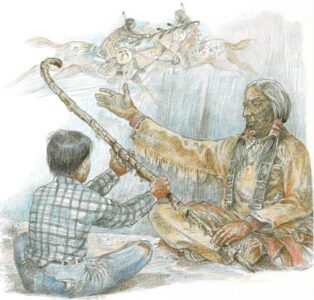Stories
Thunder Butte
from When Thunders Spoke by Virginia Driving Hawk Sneve
Fifteen-year-old Norman Two Bull is a modern Sioux boy who does not
accept the old Indian beliefs. One night he goes to his grandfather’s
tent, which is near Norman’s house on the Sioux reservation. Old Matt
Two Bull tells him that he has dreamed that if Norman would go to the
top of the Butte of Thunders—known to the Sioux as a Wakan, or holy
hill—good things will happen. But Norman must follow the old way—up
the south side and down the west side. When Norman agrees, his
grandfather gives him a strong willow cane to use as a probe and a
weapon. Early the next morning, Norman sets out. After a difficult
climb, he finally reaches the top of the butte.
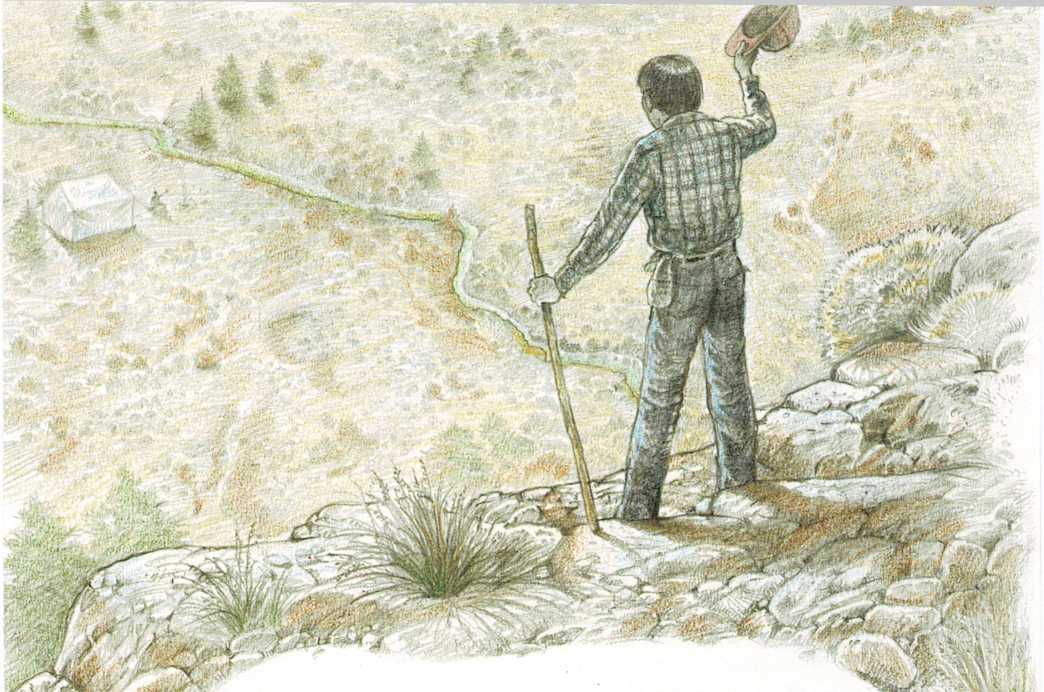
Norman gazed at a new world. The sun bathed the eastern valley in pale
yellow which was spotted with dark clumps of sage. The creek was a green
and silver serpent winding its way to the southeast. His grandfather’s
tent was a white shoe box in its clearing, and beside it stood a
diminutive form waving a red flag. It was Matt Two Bull signaling with
his shirt, and Norman knew that his grandfather had been watching him
climb. He waved his hat in reply and then walked to the outer edge of
the butte.^1^
The summit was not as smoothly flat as it looked from below. Norman
stepped warily over the many cracks and holes that pitted the surface.
He was elated that he had successfully made the difficult ascent, but
now as he surveyed the butte top he had a sense of discomfort.
There were burn scars on the rough summit, and Norman wondered if these
spots were where the lightning had struck, or were they evidence of
ancient man-made fires? He remembered that this was a sacred place to
the old ones and his uneasiness increased. He longed to be back on the
secure level of the plains.
On the west edge he saw that the butte cast a sharp shadow below because
the rim protruded as sharply as it had on the slope he’d climbed. Two
flat rocks jutted up on either side of a narrow opening, and Norman saw
shallow steps hewn into the space between. This must be the trail of
which his grandfather had spoken.
Norman stepped down and then quickly turned to hug the butte face as the
steps ended abruptly in space. The rest of the rocky staircase lay
broken and crumbled below. The only way down was to jump.
He cautiously let go of the willow branch and [^4]

watched how it landed and bounced against the rocks. He took a deep
breath as if to draw courage from the air. He lowered himself so that he
was hanging by his fingertips to the last rough step, closed his eyes
and dropped.
The impact of his landing stung the soles of his feet. He stumbled and
felt the cut of the sharp rocks against one knee as he struggled to
retain his balance. He did not fall and finally stood upright breathing
deeply until the wild pounding of his heart slowed. “Wow,” he said
softly as he looked back up at the ledge, “that must have been at least
a twenty-foot drop.”
He picked up the willow branch and started walking slowly down the steep
slope. The trail Matt Two Bull had told him about had been obliterated
by years of falling rock. Loose shale and gravel shifted under Norman’s
feet, and he probed cautiously ahead with the cane to test the firmness
of each step.
He soon found stones which he thought were agates. He identified them by
spitting on each rock and rubbing the wet spot with his finger. The dull
rock seemed to come alive! Variegated hues of brown and gray glowed as
if polished. They were agates all right. Quickly he had his salt bag
half full.
It was almost noon and his stomach growled. He stopped to rest against a
large boulder and pulled out his lunch from his shirt. But his mouth was
too dry to chew the cheese sandwich. He couldn’t swallow without water.
Thirsty and hungry, Norman decided to go straight down the butte and
head for home.
Walking more confidently as the slope leveled out he thrust the pointed
cane carelessly into the ground. He suddenly fell as the cane went deep
into the soft shale.
Norman slid several feet. Loose rocks rolled around him as he came to
rest against a boulder. He lay still for a long time fearing that his
tumble might cause a rock fall. But no thundering slide came, so he
cautiously climbed back to where the tip of the willow branch protruded
from the ground.
He was afraid that the cane may have plunged into a rattlesnake den.
Carefully he pulled out the stout branch, wiggling it this way and that
with one hand while he dug with the other. It came loose, sending a
shower of rocks down the hill, and Norman saw that something else was
sticking up in the hole he had uncovered.
Curious, and seeing no sign of snakes, he kept digging and soon found
the tip of a leather-covered stick. Bits of leather and wood fell off in
his hand as he gently pulled. The stick, almost as long as he was tall
and curved on one end, emerged as he tugged. Holding it before him, his
heart pounding with excitement, he realized that he had found a thing
that once belonged to the old ones.
Norman shivered at the thought that he may have disturbed a grave, which
was tehinda, forbidden. He
cleared more dirt away but saw no bones nor other sign that this was a
burial place. Quickly he picked up the stick and his willow cane and
hurried down the hill. When he reached the bottom he discovered that in
his fall the salt bag of agates had pulled loose from his belt. But he
did not return to search for it. It would take most of the afternoon to
travel around the base of the butte to the east side.
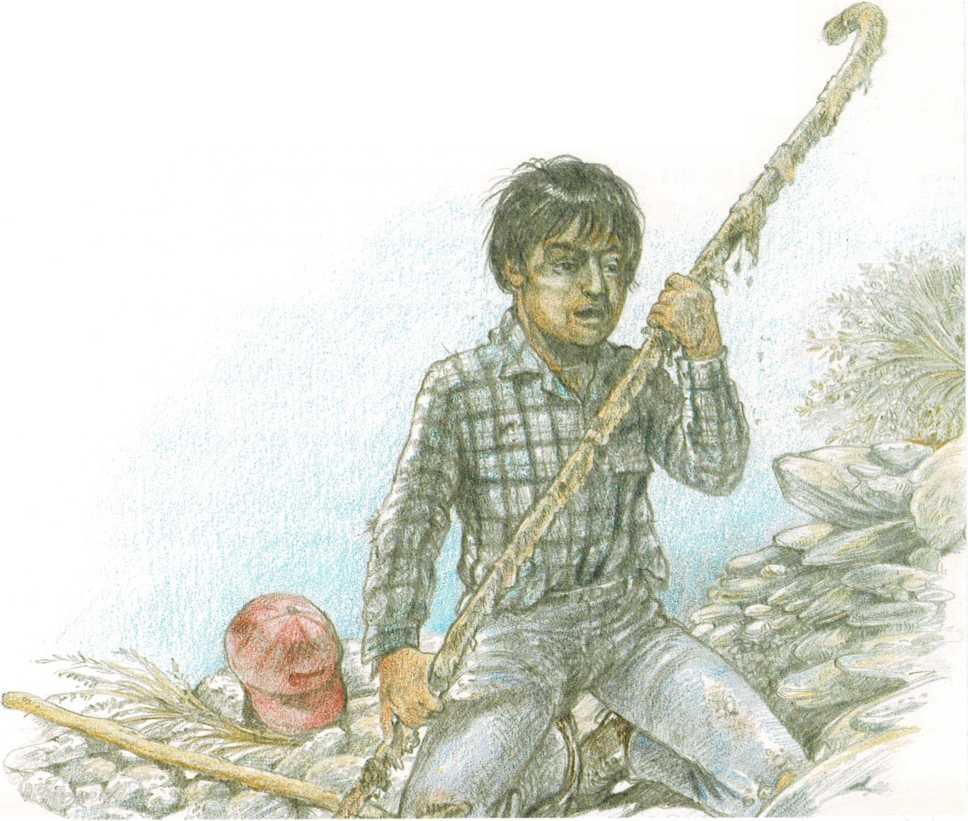
The creek was in the deep shade of the butte when he reached it and
thirstily flopped down and drank. He crossed the shallow stream and
walked to his grandfather’s tent.
“You have been gone a long time,” Matt Two Bull greeted as Norman walked
into the clearing where the old man was seated.
“I have come from the west side of the butte, Grandpa,” Norman said
wearily. He sat down on the ground and examined a tear in his jeans and
the bruise on his knee.
“Was it difficult?” the old man asked.
“Yes,” Norman nodded. He told of the rough climb up the south slope, the
jump down and finally of his fall which led him to discover the long
leather-covered stick. He held the stick out to his grandfather who took
it and examined it carefully.
“Are you sure there was no body in the place where you found this?”
Norman shook his head. “No, I found nothing else but the stick. Do you
know what it is, Grandpa?”
“You have found a coup stick which belonged to the old ones.”
“I know that it is old because the wood is brittle and the leather is
peeling, but what is—was a coup stick?” Norman asked.
“In the days when the old ones roamed all of the plains,” the old man
swept his hand in a circle, “a courageous act of valor was thought to be
more
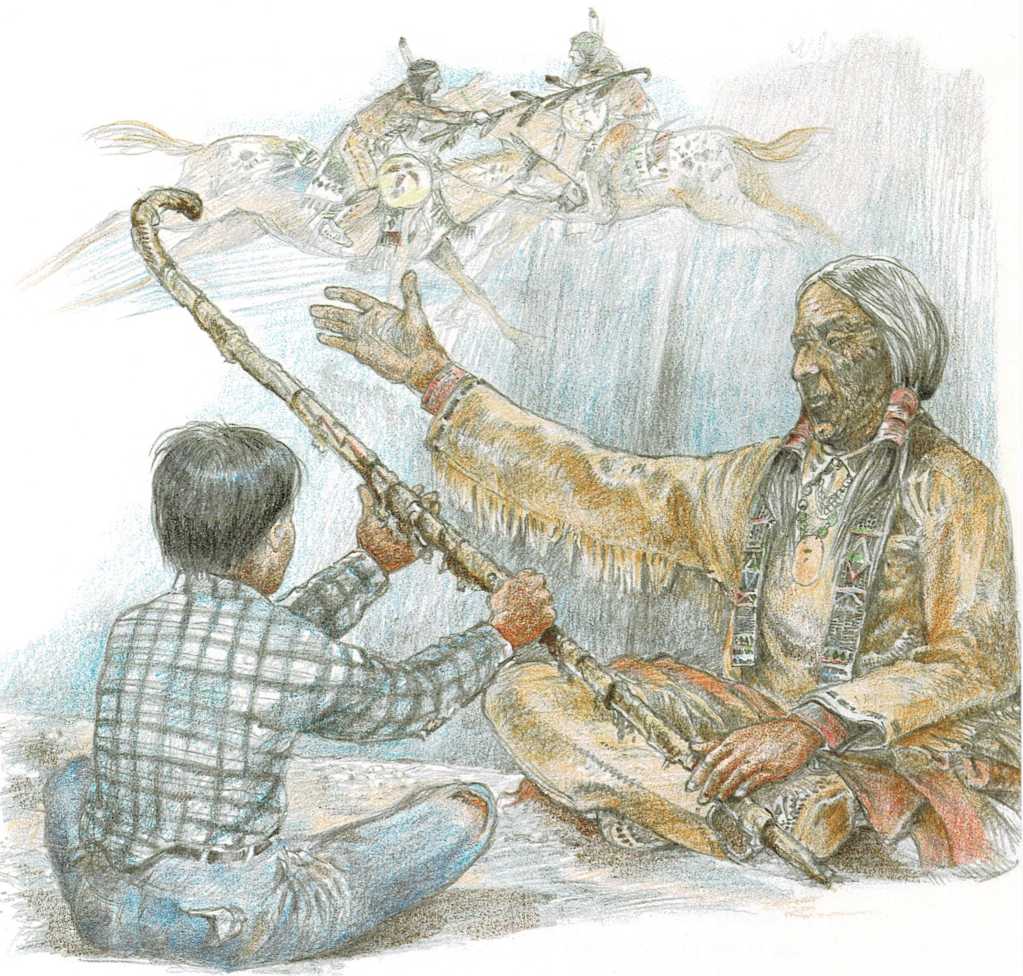
important than killing an enemy. When a warrior rode or ran up to his
enemy, close enough to touch the man with a stick, without killing or
being killed, the action was called coup.
“The French, the first white men in this part of the land, named this
brave deed coup. In their language the word meant ‘hit’ or ‘strike.’
The special stick which was used to strike with came to be known as a
coup stick.
“Some sticks were long like this one,” Matt Two Bull held the stick
upright. “Some were straight, and others had a curve on the end like the
sheep herder’s crook,” he pointed to the curving end of the stick.
“The sticks were decorated with fur or painted leather strips. A warrior
kept count of his coups by tying an eagle feather to the crook for
each brave deed. See,” he pointed to the staff end, “here is a remnant
of a tie thong which must have once held a feather.”
The old man and boy closely examined the coup stick. Matt Two Bull
traced with his finger the faint zig zag design painted on the stick.
“See,” he said, “it is the thunderbolt.”
“What does that mean?” Norman asked.
“The Thunders favored a certain few of the young men who sought their
vision on the butte. The thunderbolt may have been part of a sacred
dream sent as a token of the Thunders’ favor. If this was so, the young
man could use the thunderbolt symbol on his possessions.”
“How do you suppose the stick came to be on the butte?” Norman asked.
His grandfather shook his head. “No one can say. Usually such a thing
was buried with a dead warrior as were his weapons and other prized
belongings.”
“Is the coup stick what you dreamed about, Grandpa?”
“No. In my dream I only knew that you were to find a Wakan, a holy
thing. But I did not know what it would be.”
Norman laughed nervously. “What do you mean, Wakan? Is this stick
haunted?”
Matt Two Bull smiled, “No, not like you mean in a fearful way. But in a
sacred manner because it once had great meaning to the old ones.”
“But why should I have been the one to find it?” Norman questioned.
His grandfather shrugged, “Perhaps to help you understand the ways—the
values of the old ones.”
“But nobody believes in that kind of thing anymore,” Norman scoffed.
“And even if people did, I couldn’t run out and hit my enemy with the
stick and get away with it.” He smiled thinking of Mr. Brannon. “No one
would think 1 was brave. I’d probably just get thrown in jail.”
Suddenly Norman felt compelled to stop talking. In the distance he heard
a gentle rumble which seemed to come from the butte. He glanced up at
the hill looming high above and saw that it was capped with dark,
low-hanging clouds.
Matt Two Bull looked too and smiled. “The Thunders are displeased with
your thoughts,” he said to Norman. “Listen to their message.”
A sharp streak of lightning split the clouds and the thunder cracked and
echoed over the plains.
Norman was frightened but he answered with bravado, “The message I get
is that a storm is coming,” but his voice betrayed him by quavering.
“Maybe you’d better come home with me, Grandpa. Your tent will be soaked
through if it rains hard.”
“No,” murmured Matt Two Bull, “no rain will come. It is just the
Thunders speaking.” There was another spark of lightning, and an
explosive reverberation sounded as if in agreement with the old man.
Norman jumped to his feet. “Well, I’m going home. Mom will be worried
because I’m late now.” He turned to leave.
“Wait!” Matt Two Bull commanded. “Take the coup stick with you.”
Norman backed away, “No, I don’t want it. You can have it.”
The old man rose swiftly despite the stiffness of his years and sternly
held out the stick to the boy. “You found it. It belongs to you. Take
it!”
Norman slowly reached out his hands and took the stick.
“Even if you think the old ways are only superstition and the stick no
longer has meaning, it is all that remains of an old life and must be
treated with respect.” Matt Two Bull smiled at the boy. “Take it,” he
repeated gently, “and hang it in the house where it will not be
handled.”
Norman hurried home as fast as he could carrying the long stick in one
hand and the willow cane in the other. He felt vaguely uneasy and
somehow a little frightened. It was only when he reached the security of
his home that he realized the thunder had stopped and there had been no
storm.
“Mom,” he called as he went into the house, “I’m home.”
His mother was standing at the stove. “Oh, Norman,” she greeted him
smiling. “I’m glad you’re back. I was beginning to worry.” Her welcoming
smile turned to a frown as she saw the coup stick in Norman’s hand.
“What is that?”
“Grandpa says it’s a coup stick. Here,” Norman handed it to her, “take
a look at it. It’s interesting the way it is made and decor—“
“No,” Sarah interrupted and backed away from him. “I won’t touch that
heathen thing no matter what it is! Get it out of the house!”
“What?” Norman asked, surprised and puzzled.
“There is nothing wrong with it. It’s just an old stick I found up on
the butte.”
“I don’t care,” Sarah insisted. “I won’t have such a thing in the
house!”
“But, Mom,” Norman protested, “it’s not like we believe in those old
ways the way Grandpa does.”
But Sarah was adamant. “Take it out of the house!”
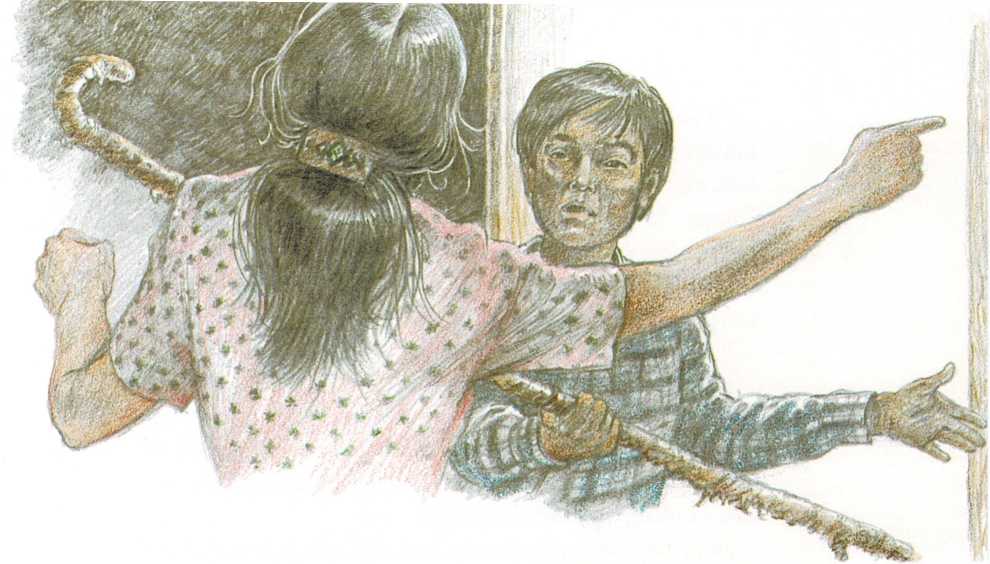
she ordered, pointing to the door. “We’ll talk about it when your dad
gets home.”
Reluctantly Norman took the coup stick outside and gently propped it
against the house and sat on the steps to wait for his father. He was
confused. First by his grandfather’s reverent treatment of the coup
stick as if it were a sacred object and then by Sarah’s rejection of it
as a heathen symbol.
He looked at the stick where it leaned against the wall and shook his
head. So much fuss over a brittle, rotten length of wood. Even though he
had gone through a lot of hard, even dangerous, effort to get it he was
now tempted to heave it out on the trash pile.
Norman wearily leaned his head against the house. He suddenly felt tired
and his knee ached. As he sat wearily rubbing the bruise John Two Bull
rode the old mare into the yard. Norman got up and walked back to the
shed to help unsaddle the horse.
John climbed stiffly out of the saddle. His faded blue work shirt and
jeans were stained with perspiration and dirt. His boots were worn and
scuffed.
“Hard day, Dad?” Norman asked.
“Yeah,” John answered, slipping the bridle over the mare’s head.
“Rustlers got away with twenty steers last night. I spent the day
counting head and mending fences. Whoever the thief was cut the fence,
drove a truck right onto the range and loaded the cattle without being
seen.” He began rubbing the mare down as she munched the hay in her
manger.
“How did your day on the butte go?” John asked.
“Rough,” Norman answered. “I’m beat too. The climb up the butte was
tough and coming down was bad too.” He told his father all that had
happened on the butte, winding up with the climax of his falling and
finding the old coup stick.
John listened attentively and did not interrupt until Norman told of
Matt Two Bull’s reaction to the stick. “I think Grandpa’s mind has
gotten weak,” Norman said. “He really believes that the coup stick has
some sort of mysterious power and that the Thunders were talking.”
“Don’t make fun of your grandfather,” John reprimanded, “or of the old
ways he believes in.”
“Okay, okay,” Norman said quickly, not wanting another scolding. “But
Mom is just the opposite from Grandpa,” he went on. “She doesn’t want
the coup stick in the house. Says it’s heathen.”
He walked to the house and handed the stick to his father. John examined
it and then carried it into the house.
“John!” Sarah exclaimed as she saw her husband bring the stick into the
room. “I told Norman, and I tell you, that I won’t have that heathenish
thing in the house!”
But John ignored her and propped the stick against the door while he
pulled his tool box out from under the washstand to look for a hammer
and nails.
“John,” Sarah persisted, “did you hear me?”
“I heard,” John answered quietly, but Norman knew
his father was angry. “And I don’t want to hear anymore.”
Norman was surprised to hear his father speak in such a fashion. John
was slow to anger, usually spoke quietly and tried to avoid conflict of
any kind, but now he went on.
“This,” he said holding the coup stick upright, “is a relic of our
people’s past glory when it was a good thing to be an Indian. It is a
symbol of something that shall never be again.”
Sarah gasped and stepped in front of her husband as he started to climb
a chair to pound the nails in the wall above the window. “But that’s
what I mean,” she said. “Those old ways were just superstition. They
don’t mean anything now—they can’t because such a way of life can’t be
anymore. We don’t need to have those old symbols of heathen ways hanging
in the house!” She grabbed at the coup stick, but John jerked it out
of her reach.
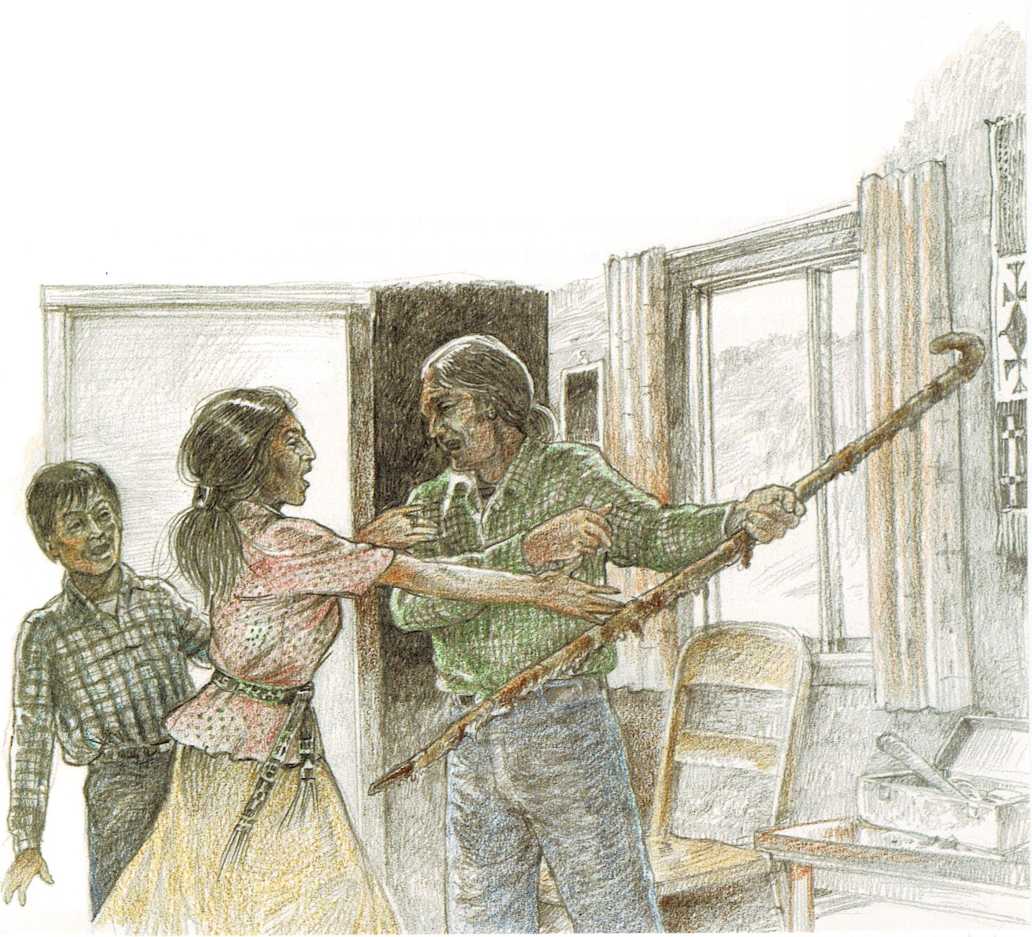
“Don’t touch it!” he shouted and Sarah fell back against the table in
shocked surprise. Norman took a step forward as if to protect his
mother. The boy had never seen his father so angry.
John shook his head as if to clear it. “Sarah, I’m sorry. I didn’t mean
to yell. It’s just that the old ones would not permit a woman to touch
such a thing as this.” He handed Norman the stick to hold while he
hammered the nails in the wall. Then he hung the stick above the window.
“Sarah,” he said as he put the tools away, “think of the stick as an
object that could be in a museum, a part of history. It’s not like we
were going to fall down on our knees and pray to it.” His voice was
light and teasing as he tried to make peace.
But Sarah stood stiffly at the stove preparing supper and would not
answer. Norman felt sick. His appetite was gone. When his mother set a
plate of food before him he excused himself saying, “I guess I’m too
tired to eat,” and went to his room.
But after he had undressed and crawled into bed he couldn’t sleep. His
mind whirled with the angry words his parents had spoken. They had never
argued in such a way before. “I wish I had never brought that old stick
home,” he whispered and then pulled the pillow over his head to shut out
the sound of the low rumble of thunder that came from the west.
[5ye]{.smallcaps}
Old Matt Two Bull dreamed of good things happening if Norman climbed the
butte. But the first thing the old coup stick brings is a family
argument. You can find out what happens next by reading When Thunders
Spoke. The author, Virginia Driving Hawk Sneve, who spent her childhood
on a Sioux reservation, has written other books about the American
Indians, including Betrayed, High Elk’s Treasure, and *Jimmy Yellow
Hawk.

